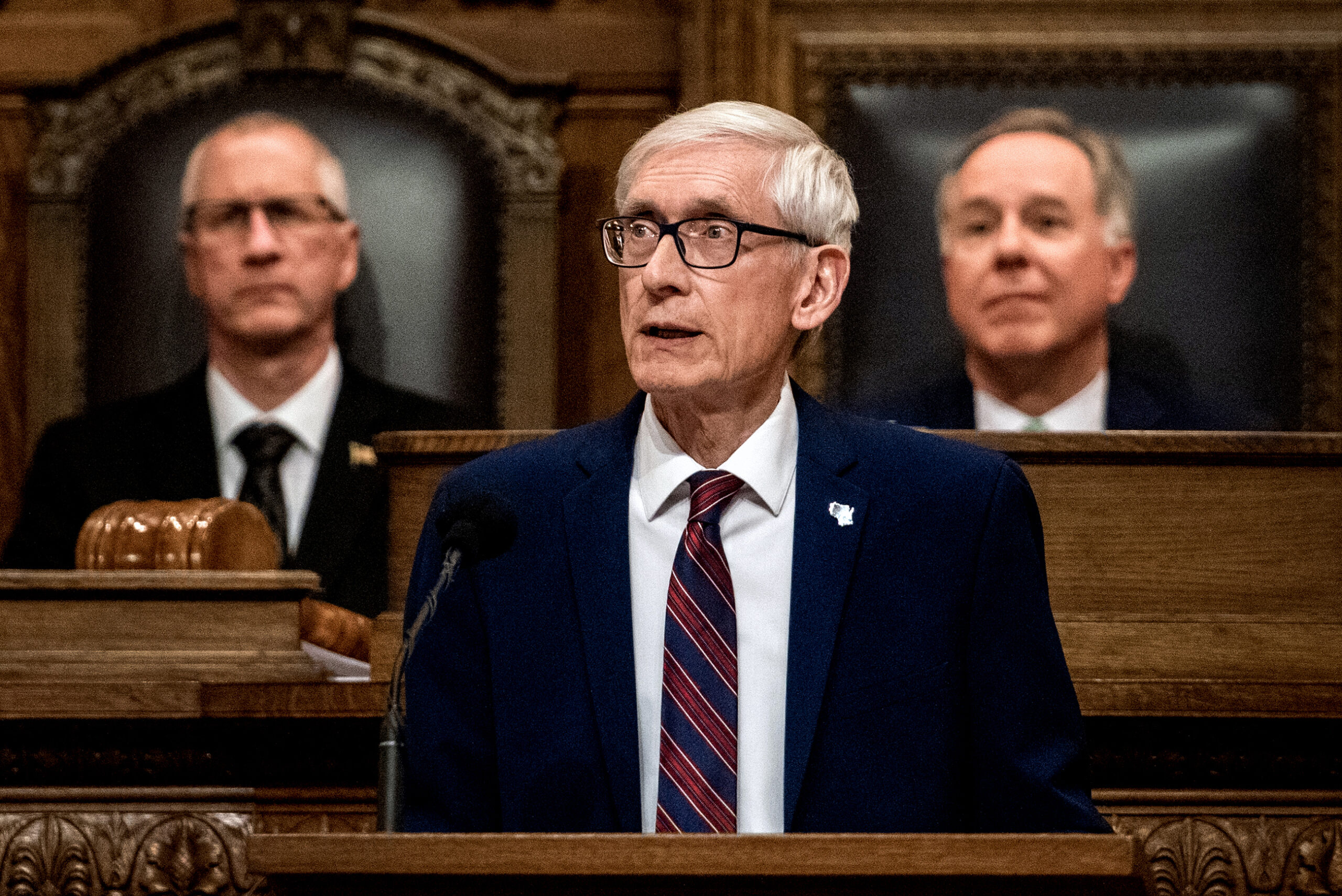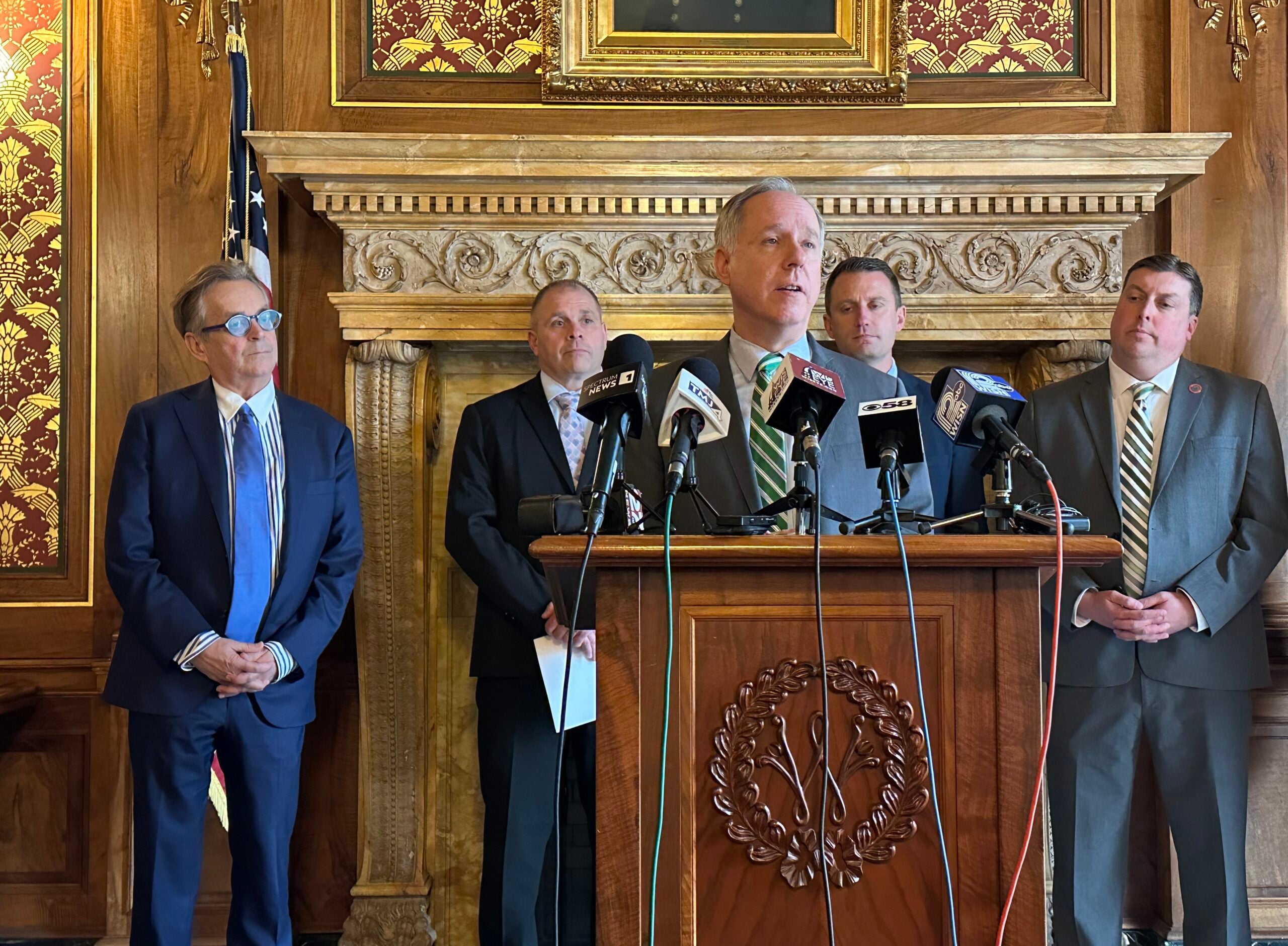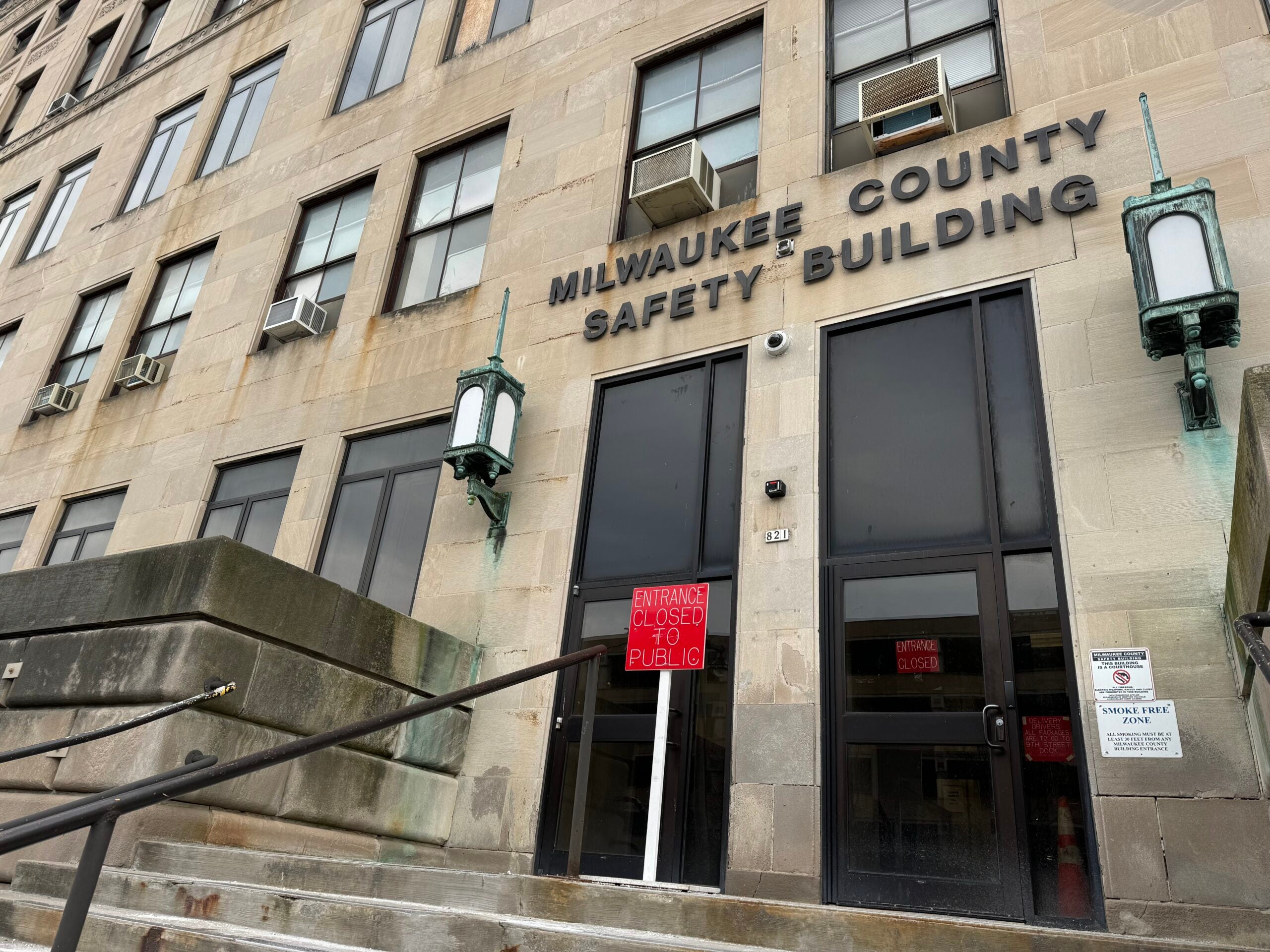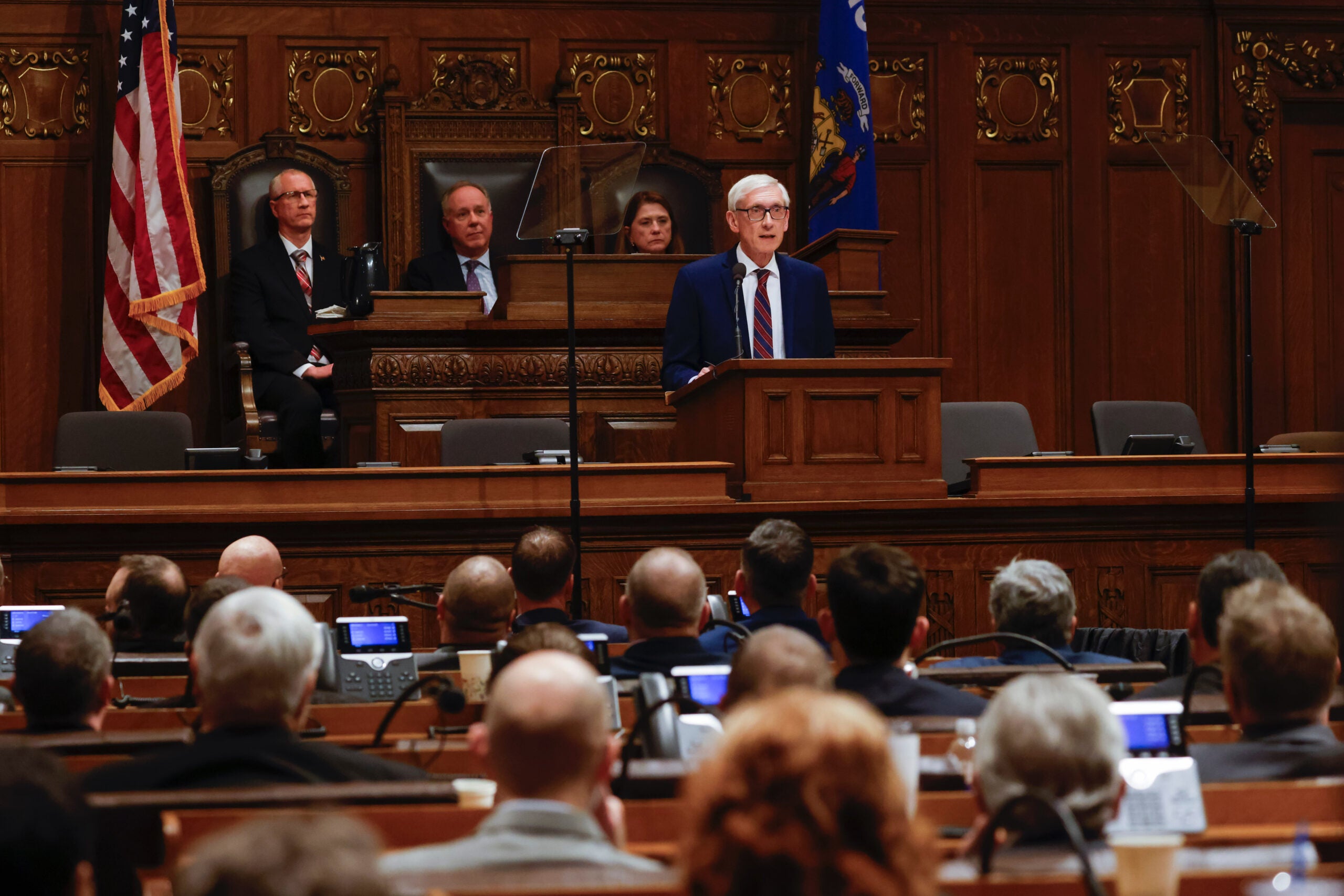Framing the state’s historic surplus as a once-in-a-lifetime opportunity, Gov. Tony Evers proposed a budget Tuesday that would spend the state’s reserves on a little bit of everything.
The governor’s budget proposal — his first since reelection — includes a new tax cut, a $2.6 billion investment in schools and a $244 million investment in a new paid family and medical leave program for private and public workers.
The list of major new initiatives from the governor went on, with hundreds of millions of dollars set aside for everything from roads, to lead pipe replacement, to the Milwaukee Brewers’ stadium.
Stay informed on the latest news
Sign up for WPR’s email newsletter.
During his budget address Wednesday evening at the Capitol, Evers, a Democrat, called the plan a “breakthrough budget,” telling lawmakers that with the state’s projected $7.1 billion budget surplus, they had an obligation to address needs that had been long neglected.
“We begin this biennium in the best fiscal position we’ve ever been in our 175-years of statehood,” Evers said. “While we must continue to stay well within our means, we have a duty to create prosperity that will define our state for generations.”
But many of the governor’s proposals will almost assuredly be dead on arrival in the Legislature, where majority Republicans have already signaled they’ll toss Evers’ budget aside and build their own, as they did during Evers’ first term.
Shortly after Evers spoke, Republicans seized on the size of the budget. It would spend almost $104 billion overall thanks to a nearly 18 percent increase in the first year of the budget. And when it comes to state funding — the part of the budget where lawmakers and governors have the most control — it would grow by 23 percent in the first year of the budget.
Evers would also add more than 800 new full-time positions across state government. And his tax cuts — which would total more than $1.5 billion — would be canceled out by an almost equal amount of revenue increases elsewhere.
“While there are some areas in Governor Evers’ budget that I’m sure we will help to find common ground on, our solutions are going to look dramatically different,” Assembly Speaker Robin Vos, R-Rochester, told reporters afterward.
Plan would create 12-week family leave program
Among the most significant proposals in the governor’s budget is a plan for up to 12 weeks of paid family and medical leave. The program would apply to both public and private employees who already qualify for the federal Family and Medical Leave program, and would be funded through payroll tax contributions from both employees and employers.
As proposed, the program would go into effect on Jan. 1, 2025, and receive one-time seed funding of $243.4 million from the state, which would come from the state’s budget surplus.
Paid family leave programs are broadly popular among voters from both parties. In a debate among Republican candidates for Wisconsin governor last year, all signaled some level of support for paid family leave. Evers’ eventual opponent in the 2022 general election, Tim Michels, was supportive of paid leave, and said he offers it as his family’s construction company. Previous Democratic bills to offer paid family leave have gone nowhere in the Wisconsin Legislature.
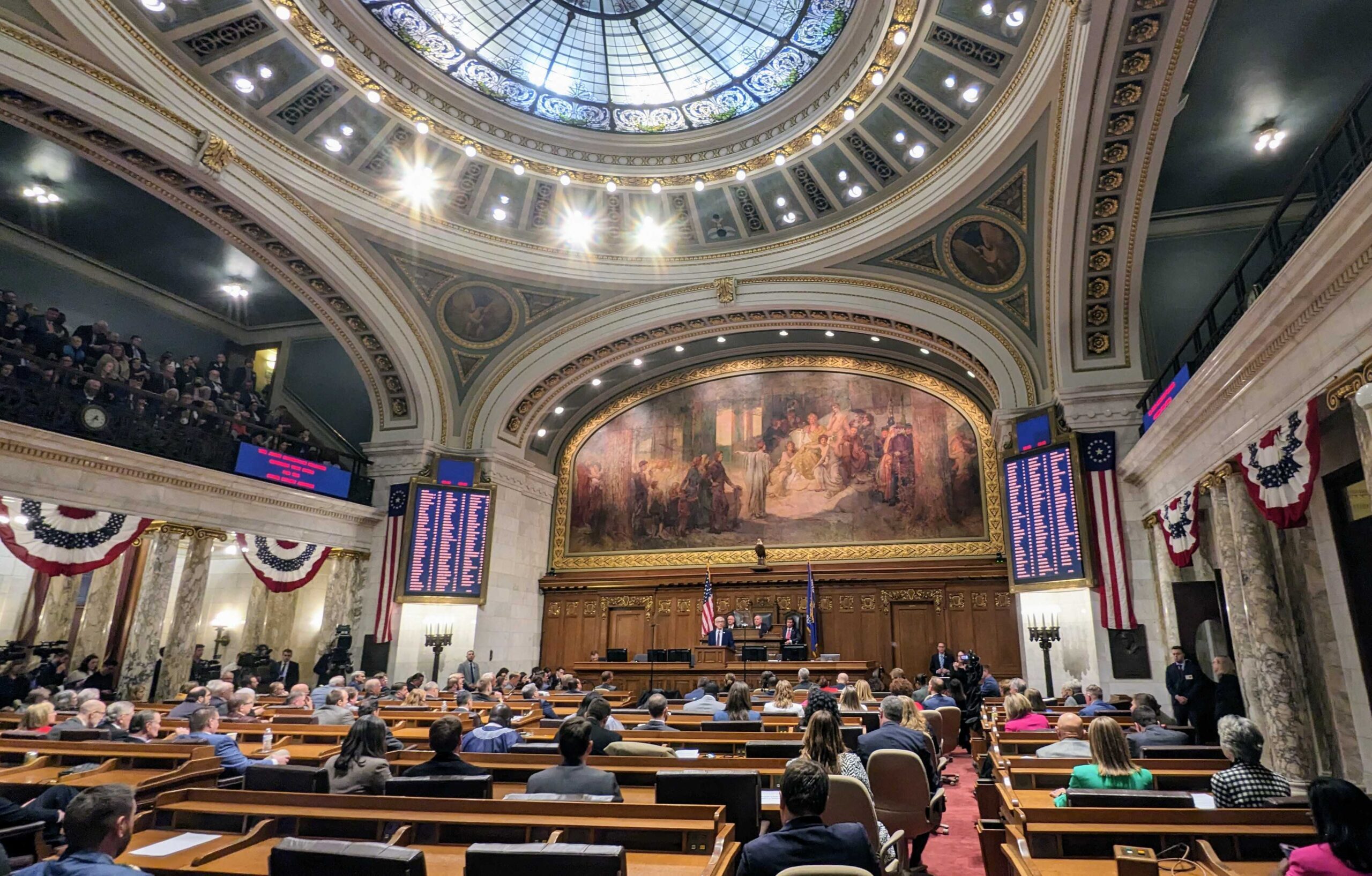
A $2.6B boost for schools, caps on private voucher schools
School funding would be the biggest driver of new spending in Evers’ budget proposal, which calls for a $2.6 billion increase for education.
The largest chunk of that funding would go toward special education costs, which public school districts are obligated under federal law to pay. Evers would spend over $1 billion on special education, covering 60 percent of the costs, a benchmark advocates have been pushing for years. A 2019 study found the state funded about 25 percent of special education costs; that total has reportedly risen to about 30 percent in recent years. In the absence of state funding, the costs fall to local school districts.
Along with that state funding, Evers also called for raising the amount districts can collect from local taxpayers by $350 per pupil in the first year of the budget and $650 per pupil in the second year. The governor’s office has said the increases would be the largest ever since revenue limits were adopted in Wisconsin. Districts received no per-pupil increase in the budget that passed the Legislature two years ago.
Evers’ education budget also called for freezing enrollment in the state’s private school voucher program and the private school special needs scholarship.
As he did in his State of the State address last month, the governor also called for a $270 million investment in student mental health through a combination of state and federal funding.
In higher education, the governor pledged $22 million in state funding for the University of Wisconsin System in the first year of the budget and $44 million in the second.
‘Fixing the darn roads’
Evers has made road repair and transportation funding a key part of his platform in both of his campaigns for governor. In the budget, he proposes transforming a one-time local road and bridge repair initiative into an ongoing program, which would cost $50 million per year.
He also proposes two new sources of funding to pay for roads: a portion of sales tax from electric vehicles, and sales tax revenue from auto parts, tires and repair services. That will increase transportation spending by about $190 million.
Evers is also proposing paying off $380 million in the state’s transportation revenue bond debt. He says that will free up funds for infrastructure repair.
“That means we’ll spend less of your hard-earned tax dollars in the future paying on debt and interest so we can stay focused on fixing the darn roads,” Evers said.
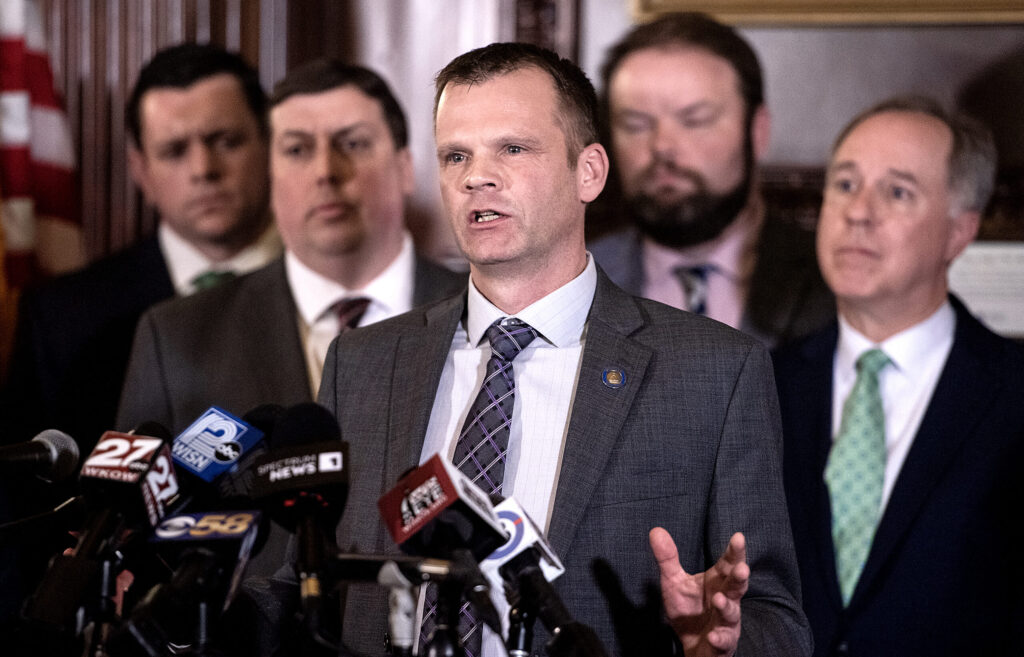
Republicans call budget ‘devoid of reality’
Addressing reporters after the speech, Republican leadership derided Evers’ plans as overly expensive and pledged to build their own budget from scratch.
“It was a budget that is absolutely devoid of reality,” said Vos. “Gov. Evers tonight talked about how his budget reflects the priorities of Wisconsinites. I think, if I listened tonight, his priorities might be in line with where we are on the topics. But the solutions are what’s dramatically different.”
Republican leaders argued that Evers’ budget expanded government too much while providing insufficient tax relief to Wisconsin residents and businesses. They also pushed back against some specifics in Evers’ proposals, such as the cap on school choice funding.
“This budget was so over the top,” said Senate Majority Leader Devin LeMahieu, R-Oostburg.
“The governor’s tax cut plan is just sort of a gimmick with a tax credit for just some earners. We need to provide tax relief for all tax hardworking taxpayers in the state of Wisconsin, and not jack up taxes on businesses in the state of Wisconsin.”
LeMahieu also said Republicans were unlikely to support Evers’ paid family leave proposal.
“We already have a standard that is above and beyond what the federal standard is for FMLA,” LeMahieu said, referring to the federal Family and Medical Leave Act. “So that’s very doubtful at this point.”
Rep. Mark Born, R-Beaver Dam, the co-chair of the Legislature’s budget committee, said a new Republican budget will focus on tax cuts, and will include a source of funding for local communities, but one that will likely differ from Evers’ proposed sales tax initiative.
“So all policy will come out — that’s just been standard procedure with this governor — and then we’ll rebuild that budget,” he said.
Other major proposals
In recent weeks, Evers previewed several major budget proposals, including putting 20 percent of sales tax revenue toward local communities for shared revenue; tweaking voting laws and creating an office of voter transparency; expanding the clean energy workforce; and delivering a $1.2 billion state income tax cut aimed at families earning under $150,000.
The budget proposal unveiled Wednesday contained dozens of other initiatives. All would need approval by Republican lawmakers.
Some of these proposals would:
- Repeal many of the restrictions placed on public sector unions by Republican former Gov. Scott Walker’s landmark collective bargaining law, known as Act 10.
- Repeal the “right to work” law signed by Walker, which banned mandatory union dues at private sector employers.
- Increase the minimum wage to $10.25 by 2026 and establish a study committee to recommend a “path” to a $15 minimum wage.
- Establish a program to license all drivers, regardless of documented status.
- Enact universal background checks for the purchase of guns and “red flag laws,” which allow courts to remove guns from people who pose a risk to themselves or others.
- Put $100 million in workforce grants to health care workers specifically, and $1 million toward health care apprenticeships.
- Put $200 million towards lead service line replacement.
- Add $750 million for broadband access across the state by 2025.
- Fund 51 new assistant district attorney positions, and 50 new public defenders, both at starting salaries of $35 per hour, and reimbursing private attorneys who take public defender cases at a rate of $100 per hour.
- Legalize recreational and medical marijuana, and put excise tax revenue from cannabis sales towards county-level mental health and substance use disorder programs. Republican leadership has made clear they will not support recreational marijuana, and may support medical marijuana only with very specific restrictions.
Wisconsin Public Radio, © Copyright 2025, Board of Regents of the University of Wisconsin System and Wisconsin Educational Communications Board.

